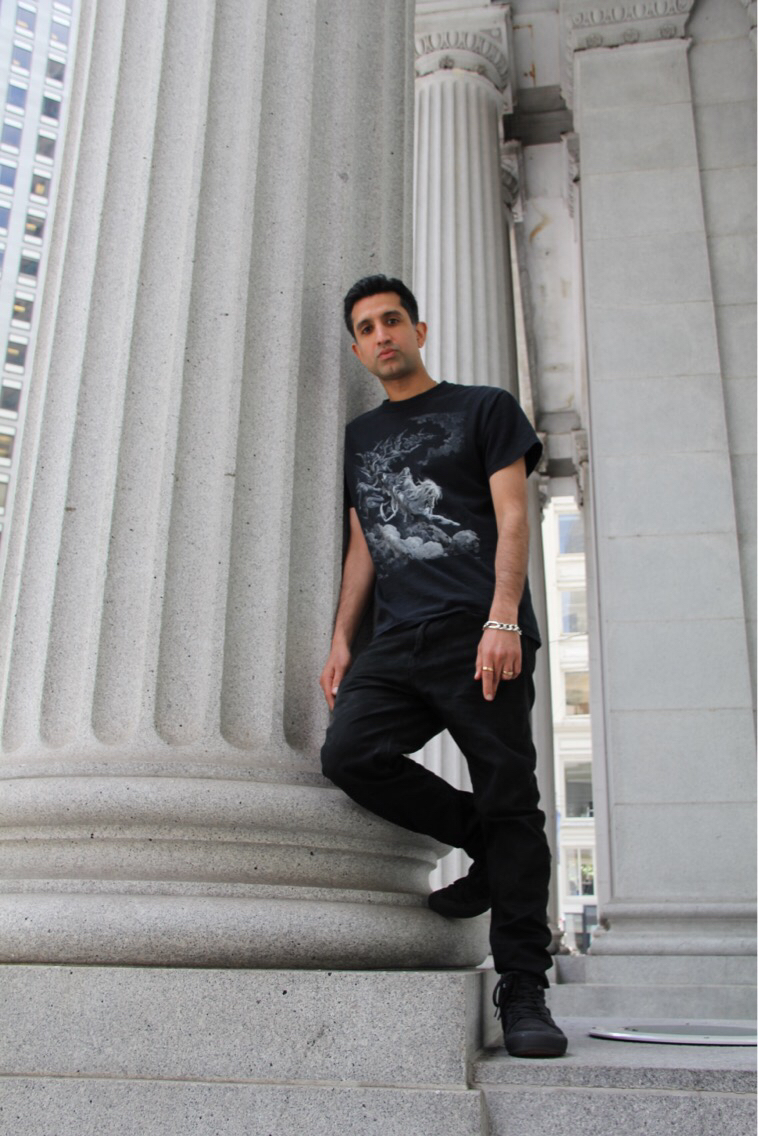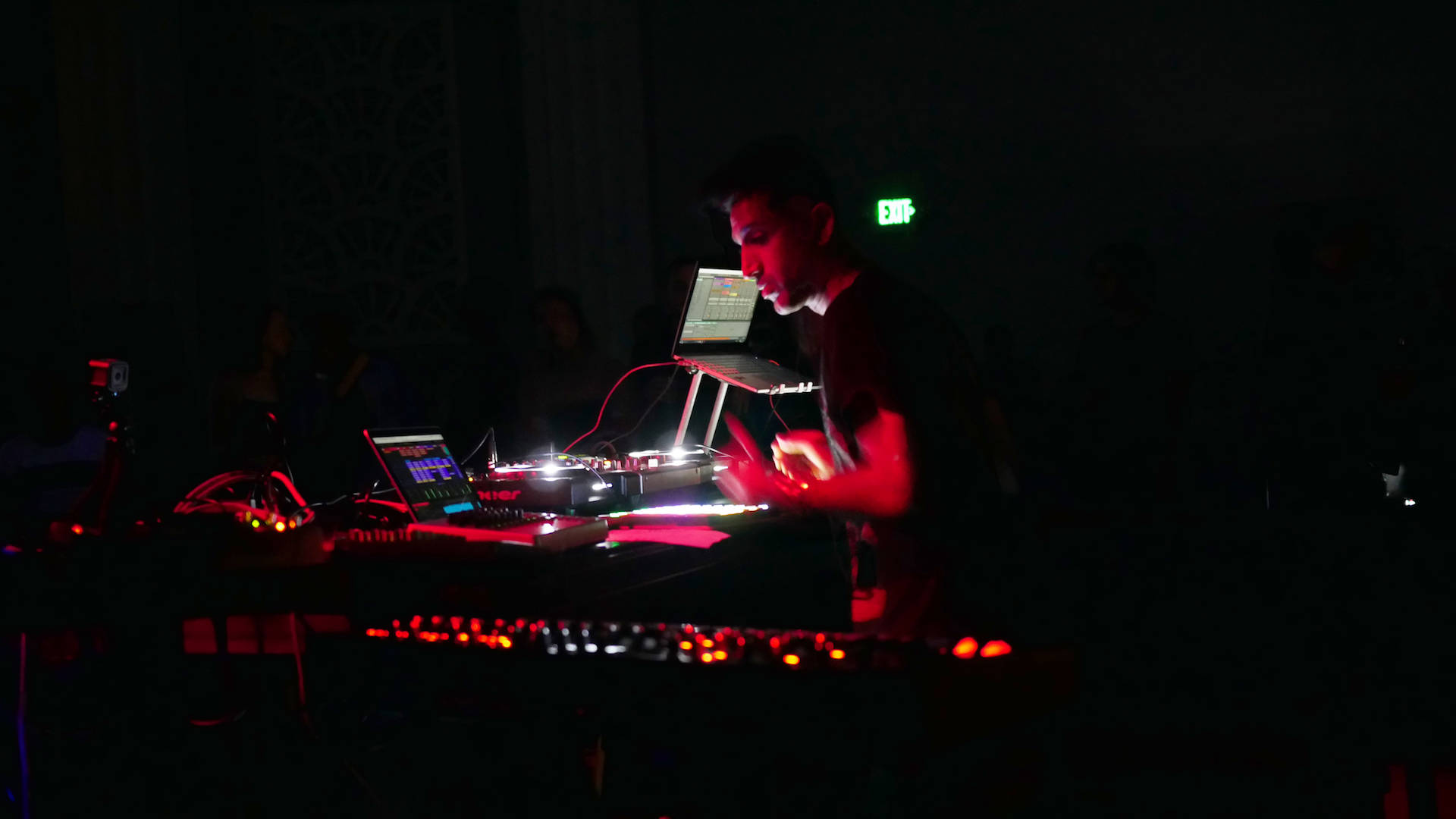Absolutely. Only Now is a project that started in 2012, ’13, for me, originally, as a solo project that was focused on any type of esoteric type of sounds, away from the music that I was doing at the time. Part of it is rooted in that experimentalism, new wave, industrial, classic schools of electronic music. The other half of it was based on kuduro, Afro-house, grime, all these niche micro-movements that are happening that I was a huge fan of, and participating, doing remixes with, collaborating. It’s like modern industrial music, but with a sense of being informed on a global level.
You’re also really involved in the dancehall world, and it seems like you collaborate with a lot of international artists.
Yeah, absolutely. And then I’m here at my day job [at Empire], doing stuff with rappers. [With Only Now,] I wanted to find a place where I could just be only myself. The first record involved a lot of actual drummers from around the Bay Area. I made a drum library with some really interesting key players from the scene to build source material from, and that was a very good, inspirational starting point for me. But then slowly I shed that, and just got more and more into my own element.
What were some of your first experiences in the local electronic scene?
Let’s take it back to 1996 or ’97. I got into electronic music probably really early: fourth, fifth, sixth grade, through college radio and just being bored, and being a single child in the ‘burbs. I grew up a metalhead, but then quickly learned about Godflesh, Skinny Puppy, those types of bands, and then just tried to find, where was that in the Bay Area?
That time in the Bay was really, really special. There was Bay Area Music Magazine, and it would list all the shows that were happening in venues around town, and they also listed a bunch of music sites. There was a site called the Cyberden, which was an industrial/ambient/gothic forum. All the local bands at the time were on that, and you could chat with people.
I started a little webzine in sixth grade. I would get promos from all the labels, and there was a lot of international labels. All these people would be sending me things, thinking I was an adult.
Simultaneously, the rave scene was at a pinnacle in the Bay. I would actually sneak out of my house in high school, get somebody off of a rave forum to pick me and a few friends up, and we’d come to raves in the city, and in Oakland — at Homebase and wherever. Then there would be day raves, where Wicked, or Solar — another Mutek guy — and Galen and DRC would play.
I’ve heard that in the late ’90s in SoMa there were a lot of warehouses where raves would take place. I’m curious how you’ve seen the scene change shape over the years.
That’s a really complicated question. I’ve had my hands in so many different scenes simultaneously, and I’m never focused on really being too involved in one scene. I’m mostly focused on creation. So coming from an outsider’s point of view on all of them, I think the prime difference is the commercial input in the music scene. Before it was warehouse parties. Gay and queer events. Straight up raves. Straight up installation type things. Now, with your Red Bull, the Boiler Room, all the brands. When I was growing up, that would’ve been blasphemy in a lot of circles to jump onboard with corporate sponsors.
Interesting. Because, yeah, I think the electronic scene went from being associated with ravers and freaks, and this really free-spirited underground scene, to a more corporatized version of that through Burning Man appealing so heavily to tech people.
Burning Man used to be cool when we were in high school. Survival Research Laboratories was a big influence to me, and that was a very big part of Burning Man early on. That was people building machines under the Division Street freeway, making crazy robots with fire and stuff. Music was all over the place but wasn’t really the focal point. I’m not going to say Burning Man is a horrible thing, it just seems kind of lame and dinky to me for the last 10 years.
One of the parties that has really reinvigorated my interest in electronic music has been Club Chai. Its founders [8ulentina and Foozool] are on the Mutek lineup as well. I think that what they do is super cool because they embrace so many eclectic sounds. How they prioritize artists of different immigrant diasporas has really opened the space up for a lot more people to get involved in the electronic scene.
I feel like that’s true. Our party, Surya Dub, did that, but there was nobody in the crew who wasn’t just a regular dude. There was one lady in the party. They brought a whole different group of people, because we had a totally different group of friends. We always booked people from — we had Bhangra and dancehall and whatever upstairs, and the we had whatever was cutting edge downstairs.
I feel like that’s inherently in the Bay Area spirit. That never left. I think that’s actually the best thing about the Bay Area. I definitely think Club Chai is probably the most visible at the moment of doing that, partially because that’s actually who they are — as opposed to somebody like me, who’s a random just regular-ass dude saying, “I include everybody,” but I don’t actually have that many friends in the gay community. You know what I mean? There’s a real difference from being within, whereas we have a huge South Asian base because we’re Indian.
I think all those pieces of the puzzle and the fact that we all talk to each other and we’re all super aware of what we’re doing is incredibly important. I think that’s what defines Bay Area club culture.
Yeah, it definitely feels like the scene is starting to bubble up again and get more recognition and legitimacy just from the national and international music community. Which brings me to: do you think Mutek coming here will lend more of a legitimacy to the San Francisco and Bay Area scene in the eyes of people from bigger cities known for electronic music like Berlin or Mexico City?
It does. I know it does, because I’ve had those conversations the moment that I announced that I was part of it. It’s been a long time bubbling, and the Bay Area has a huge root that I think this is worth mentioning: Mills College. Don Buchla, [creator of the Buchla synthesizer]. Mills College had the first Moog on the West Coast. Wendy Carlos did stuff there.
Yeah. Pauline Oliveros, Maggi Payne.
There is a huge, real root of Bay Area being absolutely essential on a worldwide level to electronic music. Then there’s a lot of the manufacturing side of it, like down in North Beach is Dave Smith Instruments, whom I work with. There’s people making synthesizers and electronic pieces here, and then there’s people making software for it out here. The first pitch/time shifting software was made in Pacifica.
To have [Mutek] be an international entity that comes in and legitimizes it on a global scale, and bring the artists that don’t come to the Bay Area unless they’re just playing one-off shows is super important because people ask all the time, “What is going on in San Francisco? You guys have no events. All the festivals are some hippie-dippy bullshit.” It’s like listening to breakbeats for like five days on end. It just seems like nobody cares. The whole world has ignored the Bay Area despite its incredible output.
All the local artists playing, most of them I know. I’ve known Secret Sidewalk guys since college. There’s a lot of names on there that I didn’t know about, so I’m actually pretty stoked that I’m going to meet people that are local who are probably doing way cooler things than I ever knew about.
To have the international legitimacy of bringing in artists like [dub techno producer] Moritz von Oswald of Rhythm & Sound, [Detroit techno pioneers] Aux 88. Aux 88 — I bought my first vinyl from them in sixth grade on 8th Street by accident. I thought it was actually a different band. Now I’m a huge fan of theirs, and they’re going to play at Mezzanine on Saturday.
Who else are you excited to see at Mutek?
Locally, I would say I’m most excited to see Secret Sidewalk, on the band side. On the experimental, local side, I would say Article Collection, which is a dude who works at Dolby who’s been throwing some cool undergrounds, too, and works with RS940109, the record store in the Tenderloin — I totally should’ve mentioned them. They’re really trying hard to revitalize San Francisco. They’re having black metal shows, and they’ll have house music the next night at their store. They supported my work, and pretty much all these guys’ work. They’re the only ones who’ve actually made a new shop in the last five years, that pushes the boundaries.
Internationally, them or [experimental dancehall duo] Equiknoxx. Equiknoxx are the guys I’ve been talking to for a long time out of Jamaica, and I’m really curious as to what their group will be like. I think they’re going to be the most different than everything else. I think they’re going to stand out as basically a wacky dancehall band in the middle of Mutek, and I think they booked us both together because we both do that type of stuff.
I think that was everything I wanted to ask you, but any last words?
First and foremost, Only Now has a project coming out with Orogen, which is another Oakland-based artist, Lucas Patzek. It’s a tape and a digital product that’s coming out of Lisbon, out of Discrepant, which is a very interesting, very on-the-fringe label. It’s tribal music that has been processed through resonant processing and physical modeling synthesis into ambient music. Super trippy, very odd, kind of mind-melting type music.
Then I worked with local band Abstracter, which is a crazy black metal doom sludge group out of Oakland whose owner, Mattia, runs Sentient Ruin, which is my favorite metal label in the country right now, and has releases from all over the world. Me and the band Sutekh Hexen, who’s a pretty cult ambient dude, we both did soundscapes and intros and outros for their upcoming vinyl. That drops June 8.
Then an Only Now full-length 12″ coming off Discrepant late this year as well. Then another Only Now release next month that will be coming out through my label, that will be on Bandcamp and Soundcloud.
Then, on the Kush Arora side, three more rhythm series. I have a rhythm series with artists from Lagos, from Nigeria, Jamaica, and Trinidad. I just released one which had that, and then I have another one which is Tifa from Jamaica, Young Alpha who writes for Burna Boy and Wizkid, and Lagos, and then Sadiki, who’s this mortician dude who lives in Trinidad.
Like a real mortician?
Yeah. Oakland bass lines, Afro beats, and dancehall — a world-wide rhythm series.





